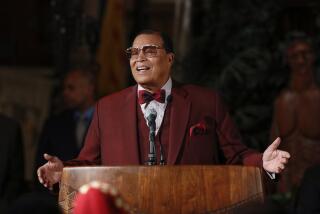UNESCO Changes Image, Focuses on Anti-Semitism
- Share via
PARIS — After demonstrating a highly symbolic political shift away from past policies, financially troubled UNESCO on Wednesday concluded an emotional two-day conference here on anti-Semitism.
Despite vociferous objections from some member states, UNESCO Director Federico Mayor broke with traditions of the Third World-oriented United Nations Educational, Scientific and Cultural Organization to co-host with the Los Angeles-based Simon Wiesenthal Center a conference focusing on resurgent anti-Semitism in Europe.
American Jewish leaders were delighted with the conference, held by an organization that only recently equated Zionism with racism and that was considered a bastion of anti-Israeli politics.
“If somebody had said four years ago that UNESCO could sponsor something like this, people would have accused them of fantasizing,” said Rabbi Marvin Hier, international director of the Wiesenthal Center. “The one subject they avoided was anti-Semitism.”
The two-day conference at the organization’s Paris headquarters was the latest example of efforts by Mayor to bring the U.N. cultural arm back into the international political mainstream. The director’s ultimate goal is to win back the United States and Britain as members. The two countries pulled out of the international organization in 1984-85, charging that UNESCO was hopelessly mired in mismanagement and Marxist-Leninist bias.
In resurgent anti-Semitism, a problem that has surfaced primarily in the newly independent former Communist states of Eastern Europe but also in the emerging extreme right-wing political parties of Europe, Mayor found a subject of compelling concern to the international Jewish community.
Many speakers at the conference spoke of their shock and dismay at the extent to which dormant anti-Semitic sentiments have been rekindled.
Nazi-hunter Simon Wiesenthal, after whom the Los Angeles center is named, set the tone for the conference in a speech. “Forty-seven years ago, when I was liberated from Mauthausen, my last concentration camp,” he said, “I could not imagine that it would be necessary only half a century later to speak up against xenophobia and anti-Semitism again.”
“The demons are back,” announced international attorney Samuel Pisar, author of “Of Blood and Hope.”
More to Read
Sign up for Essential California
The most important California stories and recommendations in your inbox every morning.
You may occasionally receive promotional content from the Los Angeles Times.










